An irreguarly-updated blog about my troubles. Names and titles have been changed to protect the innocent.
Don't wanna be here? Send us removal request.
Text
Game Retrospective: Metroid Dread
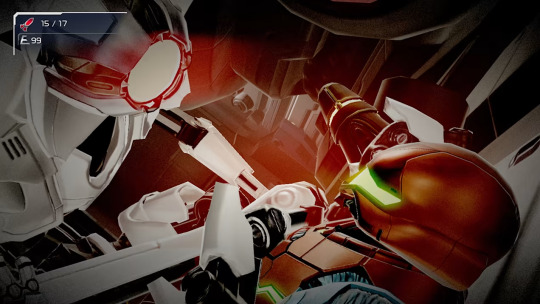
Over the last few years, I’ve been growing colder towards 2D platformers, and "search-action games" (that is, metroidvanias) in particular. I just got tired of feeling lost, I guess, and of trying to navigate the same sequence of tiny floating blocks over and over again while getting lost. I used to adore the genre, and how exploration (generally my favorite part of video games) would be rewarded with surprising and interesting new abilities (my second favorite part of video games). But after dropping games like Hollow Knight (with its boring movement and endless, boring vertical hallways) and Symphony of the Night (with its combination of clunky movement and absurd difficulty) despite them being hailed as exemplary examples of their genre, I was worried that said genre had left me behind. Looking back, the only ones I really loved are, like, Robot Wants Ice Cream, Shantae and the Pirate’s Curse, and Metroid Zero Mission, not counting 3D ones like the Metroid Prime games and Batman Arkham Asylum.
Well, Metroid Dread came out, and it proved me wrong…and right.
Simply put, this game is a blast. Movement is snappy and precise. Puzzles are always fun to solve. Combat, with the parry mechanic and ever-more-powerful abilities, is just fun. The story, while still very minimalist, has surprising depth for a 2D Metroid, and plenty of fascinating callbacks to previous games. Boss battles in particular are a great selling point; all of their designs and attacks are uniquely menacing and brutal—but at the same time, those attacks are all clearly telegraphed, so that every time I died (and I died a lot) I felt like I learned something that would make my next attempt significantly less deadly. Every time I faced a new boss, I quickly went from getting trounced in seconds to expertly dodging all of its attacks, and there really isn’t anything else I want from a boss fight.
Even the new EMMI encounters—segmented areas with only one, completely invincible enemy that stalks you and kills you in one hit—were fun to get through, and a nice change of pace from the usual running and gunning. I particularly liked the little game of chicken that you have to play with a slow-charging gun that is the only thing that can hurt them.
All of this fun is thanks to two significant changes to the Metroid formula: frequent checkpoints, and constant railroading.

The first of those is unambiguously a good thing, and something that every Search-Action game or platformer or whatever should steal. Yes, I died a lot to bosses and EMMIs, but I always respawned right outside the boss room or EMMI zone (not at the last save point, though those are plentiful too). I was always mere seconds away from my next attempt against a challenging foe, with no need to trawl through filler rooms or stress out about missing a save point.
The second change, the railroading, is arguably a bit less positive. Every time I tried to backtrack in Dread—ostensibly the main way of exploring in a Metroid game—I would hit some sort of wall. Maybe it was a one-way door. Maybe a new obstacle appeared from nowhere. Either way, the amount of actual exploration I could do in this game that is arguably about exploration was always strictly limited, until basically right up to the final boss. I think I went from 34% of items to my final total of 88% once I finally realized that I had every ability in the game and would no longer be stopped by all those arbitrary roadblocks.
There’s an upside to this limitation, of course. This is the best-paced Metroid game since the Prime games. Since I never really spent much time being lost or just walking from one end of the map to another, there was always something new and exciting around the corner. And unlike, say, Super Metroid, the controls are actually good, so I never had to juggle between different weapons or fail to execute a finicky wall-jump to get out of a kaizo trap.
Fortunately, as someone who is getting tired of the clunkier aspects of metroidvanias, I welcome this forced linearity. I’d happily play this game again, even if I might not ever get all the secret endings or find the items hidden behind particularly devious Speed Boost Block puzzles.
Strong recommend to anyone who is decent at games, unless you’re some kinda metroidvania purist.
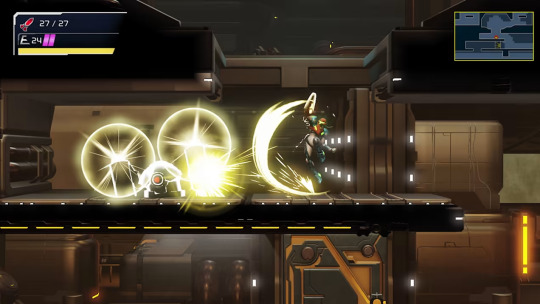
Details:
Publisher: Nintendo
Developer: MercurySteam
Release date: October 8, 2021
Played on Nintendo Switch via physical cartridge
Beat the game in 10 hrs 26 minutes (by in-game counter) with 88% completion
Image source: Nintendo.com
5 notes
·
View notes
Text
Game Retrospective: Marvel's Guardians of the Galaxy (2021)
Note: This post contains vague spoilers.
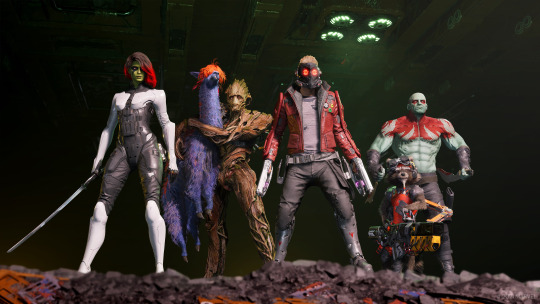
Video games are an incredibly diverse medium. You can have multiplayer-only experiences like Unreal Tournament or Counter-Strike that are mostly devoid of any narrative context, and are meant to be played for hundreds of hours or more, focusing almost exclusively on slowly improving a player’s skill at the game. But on the other hand, there are games like this Guardians of the Galaxy game, that are basically just really long movies that let you shoot things and walk around the sets every now and then—games that can have really unique experiences, but those experiences are heavily scripted and simply stop existing after a few dozen hours, if that.
Generally, I prefer the latter. Fortunately Guardians is a fantastic example of that.
In this game, you play as Star-Lord (and only Star-Lord), as you lead the recently-founded Guardians of the Galaxy (specifically Groot, Rocket, Drax, and Gamora) on a Job that slowly unravels itself into a galactic threat. In terms of mechanics, this means controlling Peter Quill as he slowly pokes around cramped, extremely linear environments, solving (pretty excellent) puzzles and occasionally finding consumables that can be used at specific points to craft upgrades.
Occasionally, there’s also combat, which is very fun if not particularly deep. You shoot bad guys with your Element Gun, which has infinite ammo but can overheat and also has several unlockable elemental powers that can be used to freeze or stun opponents. You can also direct each of members of the Guardians (including Quill himself) to perform up to four specific, unlockable attacks that do everything from attack enemies in a line to pin them to the ground with vines. There’s also a “huddle��� super move that you can activate after charging it up that requires you to make a dialogue choice to activate correctly. In a way, it feels like a mix between Mass Effect and Kingdom Hearts' battle systems---you shoot with your gun and you order your squadmates around, but there’s a lock-on camera and no cover system (you’re supposed to dodge attacks).
But when it comes down to it, the “meat” of the game—and the main reason I had such a blast with it—isn’t the exploration, or the combat, or the puzzles. It’s the story, which is just…fantastic.
All of the Guardians are multi-dimensional, brilliantly interesting characters with their own meaningful arcs and unique character quirks. Rocket is crass but always comes through in a pinch. Gamora earns her place as the Most Dangerous Woman in the Galaxy, but still happily bickers and jokes with the rest of the team and shamelessly enjoys “Girly” things like dolls. Drax is still an alien (meh) with no relation to Moondragon (meh) but he’s far from the bland “doesn’t get sarcasm” joke you might know from the films; here, he’s easily the most heartfelt and caring member of the team, all of whom respect and at times participate in his native culture. Groot is…well, Groot. And Star-Lord himself strikes a beautiful balance between the “80s loser who never grew up” from the films and the “Battle-weary war veteran” from the comics.
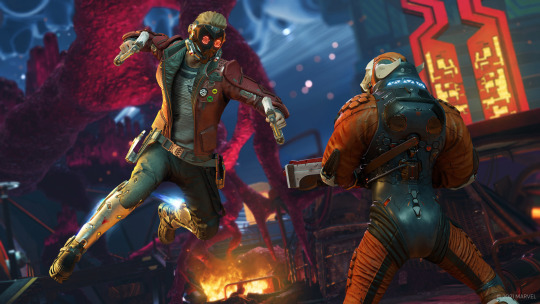
These characters’ personalities are reflected in the seemingly constant dialogue they have with each other—while you’re squeezing through a tight gap to the next story beat, while you’re briefly abandoning the story to find goodies, while in combat, while you’re just standing still, whenever. The amount of dialogue in this game is insane, and the overwhelming majority of it is brilliantly written, and often very funny, and even at times heart wrenching. I actually felt sad that I frequently missed some lines because I answered a dialogue prompt too quickly, or moved forward with the story a touch too eagerly.
Aside from the ambient dialogue, the story is quite good, excellently utilizing some of my favorite narrative tropes, and frequently exclaiming in joy when they brought in a character I loved from the comics. Everyone, even outside of the Guardians themselves, has a meaningful character arc and engaging quirks, and the twists are all just…fantastic, and well-presented (though admittedly the game’s attempts at making some of the emotional beats playable feels a bit more awkward than, when, say, Undertale does it).
There’s also dialogue choices, most of which seemingly don’t influence anything, but every now and then you have the chance to subtly change the progression (if not outcome) of the story, complete with a Telltalle-esque prompt in the upper right letting you know when you’ve succeeded or failed to influence another character (somewhat ironic, considering that the only other Guardians game is, in fact, a Telltale game). Regardless if whether your interactions actually do anything, it's still fun to be an active participant in the banter.

My only other real complaint is that the ending (or really, endings, given that the game does a poor job of faking you out) is kind of weak. It fits, for the most part, and is a blast to play through, but it falls a bit short of the otherwise brilliantly-written rest of the game. It almost feels like the game’s own medium is working against itself, demanding a cool, flashy boss fight when the game’s central conflict was already resolved excellently with a quiet moment of dialogue. Though that last post-credit scene where Star Lord talks to himself in a mirror is a perfect note to end on.
Oh, and one more thing—this game is gorgeous. After so many “Realistic” sci-fi games like Mass Effect and Halo that feature earth-like biomes and an endless supply of gray metal corridors, I am so damn happy that Guardians is not afraid to get colorful and weird, with incomprehensible geometry and anomalous organic matter populating skyboxes, spaceships that don’t look like dicks, and a constant devotion to surrealist or just unnecessary creative touches. This is a game that is not afraid to go as weird and nonsensical as the comics can be, and it excels because of it.
The game’s only real flaw is that it is, at times, plenty buggy and all-around clunky. Multiple times, I had to reload a save because a character would not move to where they needed to, softlocking my game. Other times, the game would throw a literally endless horde of really weak enemies at me, expecting me to do something else in a way that wasn’t clear, even with the prompt in the corner. Sometimes the animation is gorgeous, but other times it feels really uncanny. But these were all minor, quickly-resolved issues, that didn’t impact the impact of the game’s frequent and plentiful strong moments.
If you play games because of mechanics and gameplay loops, then I fear you might be disappointed. But if you are happy with a game that can show you a good time for a few hours and then can be freely uninstalled, I could not recommend it highly enough.
Notes:
Publisher: Square Enix
Developer: Eidos-Montréal
Release date: October 26, 2021
Played on PS5 via PS4 physical disc
Image source: Steam Store page for Marvel's Guardian's of the Galaxy
#game retrospective#guardians of the video game#guardians of the galaxy#rocket racoon#drax the destroyer#star lord#peter quill#gamora#playstation#ps5
7 notes
·
View notes
Text
Game Retrospective: Resident Evil 7: Biohazard
Note: this post contains vague spoilers.
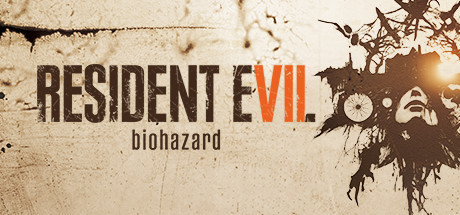
Screw it, I love horror games now.
I was always a bit of a coward growing up. I remember refusing to watch the first Harry Potter flick because the three-headed doggo in the trailer scared me too much. But I’m much older now, and with that age came maturity--at least, enough maturity to slap on a VR headset t creep through a dilapidated old house filled with people and monsters that want to do god knows what to me.
So I’ve beaten this. My second RE game after 4 (third if you count Leon A as beating REmake 2), though I played quite a bit of the first Revelations before the final boss decided to be obnoxious, and that shitty version of RE1. But that doesn’t really go into how brave I’ve become, at least when it comes to experiencing horror media.
See, most RE games are silly nonsense. Gory, dark, and powerfully atmospheric, sure—but also remorselessly goofy. Be it the hokey FMVs and voice acting of the first game, Claire’s silly outfit in the third, the demon Napoleon Bonaparte in the fourth, or the gonzo action gameplay and frenetic pacing of Revelations, this franchise has only rarely be truly horrifying. Don’t misunderstand: these games can absolutely be scary as hell when they want to. But the tone of the series as a whole has veered more towards the silly than the scary, especially after 4.
Which is why 7 felt so radically different. Damn near all of the earlier games’ inherent goofiness suddenly vanished, and instead we have a story of a guy trapped in a house with insane, seemingly cannibalistic freaks that refuse to die. The rooms ooze with grotesque detail, and the story is told in cutscenes that are as serious and polished in their animation and delivery as any western game. The whole thing is in first-person as well!
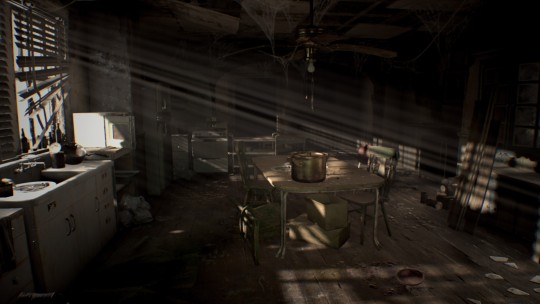
The gameplay is a nice change as well. What I really liked about RE2’s remake is that, in terms of level design, it felt halfway between an adventure game and a Metroidvania. You had to explore and backtrack across a cramped, claustrophobic environment to collect items that are used in other rooms to solve puzzles and explore more of the environment. Unlike an adventure game, these “puzzles” are usually relatively simple, but unlike a Metroidvania, the items rarely granted you extra abilities. And unlike in either genre, you had to carefully manage inventory space, ensuring that you had enough room for both key items and gameplay stuff like ammunition, weapons, and healing items.
And there’s also the enemies. Strong, brutal enemies, but the most reliable way to kill them is to use your incredibly limited ammunition, so simply running from them is a legitimate strategy.
I like that general design, and it’s here in RE7—mostly.
See, RE7 barely has normal enemies. For the first 6-ish hours of the game, your only opponents (with like 2 exceptions) are the Bakers--fully fleshed-out NPCs who are either completely unkillable or tied to a boss fight. This honestly works very well—it ensures that the enemies you fight are genuinely intimidating. That first house is horribly creepy, with fantastic detail crammed everywhere, and quite a lot of fiendishly creative tricks played on our woeful protagonist.
But after a while the game gleefully reconstructs the previous games’ approach, and honestly I liked that too. The game is great at both slow-paced, spooky exploration and relatively linear gunslinging, so I welcomed the change, especially given how hard the first half of the game was, and how satisfying the guns were to fire. And those boss fights are brilliant! Chainsaw duel! Running a guy over with a car in his own garage! Whatever the hell Jack was, with the upside-down head!

Now all this is great on a flat screen…but in VR, it’s a completely different beast. Being able to look around the Baker mansion and its related areas by moving your actual neck, and seeing it all in stereoscopic 3D, is wonderfully and disturbingly immersive. Being able to aim by looking at enemies is also a blast. It fully confirmed that VR is my favorite way to play games like this…even if the implementation here is drowning in caveats:
The resolution and other graphical capabilities of PSVR are extremely limited. This isn’t a problem in graphically simple games like SUPERHOT VR or games designed from the ground up for the platform like Astro Bot (which is still my favorite VR game)—but in a game as intricately detailed as RE7, you run into a lot of problems. All the character models look janky, with jagged edges and other limited details. Still incredibly immersive, but the issues are there.
As mentioned, you aim with your neck (or, in other words, moving the headset) rather than pointing a controller. The former is fine, but the latter would be much more immersive, and allow me to shoot without looking at these hideous beasts. There is, of course, no support for the Move or Aim controllers. Playing with the standard PS4 controller works perfectly fine, and aiming with my neck is definitely better than aiming with the control stick (or, dare I say it, a mouse), but it’s an odd choice that few VR games make.
Many times, the game switches from in-engine cinematics to pre-rendered ones. The former work in VR…but the latter do not. This is intended to be a subtle switch, but it’s jarringly obvious in VR, since it suddenly goes from a full immersive environment to a flat screen. This has the effect of lessening the impact of some twists and scripted sequences, especially in the final boss fight.
Despite how seriously the game takes itself, I was never truly horrified like I was with, say, SOMA. The game never really dives into any deep, thematically resonant territory—at least, not themes so simplistic, or maybe just subtle, that I dismissed them outright. It’s just Spooky House With Kooky Killers, The Game. There’s nothing really wrong with that, but I honestly feel like it should be more. The game is so damn good at being a Spooky House game, and does it so artfully, that I feel that something deeper should be easy for the game’s writers.
Like, what is there? Parental abandonment? You can’t really claim that’s a theme when the “parent” is an evil creator and manager of B.O.W.s and the “child” is an explicitly insane eldritch abomination. Those things completely ruin any chance of the story working as an allegory.
But still a great game besides that.

Game notes:
Developer/Publisher: Capcom
Time to beat: about 10 hours
Got Ending 1, normal difficulty, playing mostly in VR
Header image from the game’s Steam page; other images are screenshots from the game’s PC “Beginning Hour” Demo (and thus are not representative of how the game looked when I played it, especially in VR).
2 notes
·
View notes
Text
Game Retrospective: Quake
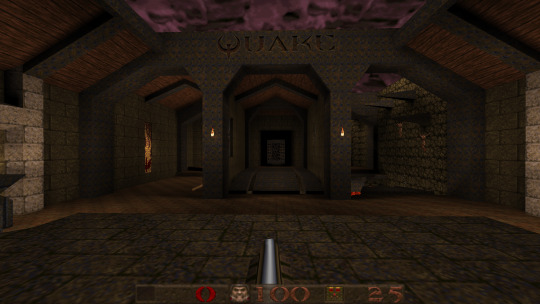
Quake is probably the simplest FPS I’ve ever played. Yes, even simpler than Doom. Going into the ‘92 Doom game feels a bit alien compared to modern FPS games, or at least semi-modern ones like Half-Life and Halo CE—in that practically geriatric game, all the enemies are sprites, there’s really no verticality to speak of, and something as simple as jumping can only be added in through a source port or other mod.
But Quake, on the other hand, feels more or less how an FPS should feel. Enemies are made of actual polygons; the Y-axis exists, so you have to both look and aim up and down; and you jump like a bunny rabbit.
The thing is, that is it in terms of basic controls and the interface. You have health, armor, ammo, and like 7 weapons (two shotguns, two automatic weapons, a rocket launcher and a grenade launcher that use the same ammo, and a useless melee weapon), a jump button, swimming, and nothing else. No reloading, no regenerating health, no crouching, no dedicated grenade or melee buttons, not even an interact button. There’s technically a sprint button, but there’s never any reason to turn auto-sprint off.
Like I said, even Doom requires the player to slightly adjust their approach when compared to modern FPS games (like, say, DOOM 2016) to account for the 2d nature of the game. But the biggest differences from modern FPSes to Quake aren’t what quake does differently, but what quake lacks.
It is literally the player, some fairly clever levels, a bunch of monsters, and a nice helping of guns, and some powerups every now and then, and that is it. The only story in the game is told in text dumps after beating every episode, and there’s no real tutorials to speak of.
The end result is a game that felt clean, natural, and exciting in ways that modern games can never really hope to achieve. This was a game where I could go from nothing to blasting aliens and exploring intricate levels in seconds, for seconds, or however long I had.

The levels were twisty enough to be enjoyable to explore without being so labyrinthine that I spent most of the game backtracking for keycards. Secrets were placed in areas that were tantalizingly out of reach as much as they were completely obscured. Enemies and environments fit a nice variety of aesthetic designs, from spider-like creatures with human torsos to alien soldiers. Combat benefited from a nice variety of opponents, from monsters that shoot lasers at you if you look at them for longer than a second to flying enemies to zombies that only die if you explode them with a grendade (rather than just shooting them). The creepy enemy designs and the oppressive, booming soundtrack (from Trent Reznor!) created a gripping atmosphere, especially for a game like this that doesn’t really look like much of anything other than a, well, video game.
So yeah I had fun.
Various notes:
Played on PC via Bethesda.net (and QuakeSpasm to play the game on a modern PC with NIN’s OST)
Completed in around 5 hours
Completed the main campaign, never touching the multiplayer. Had to noclip to get to the final boss since the game wasn’t accurately keeping track of when I beat an episode
Source for screenshots is myself
Developer: id Software
Publisher: Bethesda/Zenimax (originally GT Interactive)
Originally released in 1996
4 notes
·
View notes
Text
Skyward Sword should not cost $60 in 2021
Skyward Sword is a game just a few months shy of being a full decade old. I am apparently an anomaly in that I really liked the game, so I was looking forward to being able to play it on the Switch, but when I saw the price on the eShop I was shocked.
It simply should not cost a full $60, all these years later, when all that's added is an HD/60fps coat of paint, an awkward workaround for the controls, and according to the eShop page some form of amiibo support.
I can think of many reasons for this:
The Wii U HD remasters of Wind Waker and Twilight Princess were $50, and the latter of those even included an Amiibo in its $60 edition. Yes, $50 for a decade-old game is still a lot to ask, but at least they pretended it wasn't a full-price title.
The Wii U remasters of WW and TP actually changed things. Both remasters added a load of UI/UX tweaks, excellent use of the GamePad, and TP added a small but notable bonus dungeon (that admittedly you needed the amiibo for). Unless Nintendo is hiding something, all SSHD is changing are the resolution, framerate, and control scheme--things that emulators have been doing for years.
When Mario got his Wii game ported, it was with two whole other games and a sound test menu. Zelda fans are objectively getting less for more.
When SS came out on Wii, it was either US $50 or $70 depending upon if you wanted to buy the base game or the fancy edition with a shiny gold Wii Remote--the new, "plus” version of the remote, even. Either version also included a CD with some great orchestral covers of Zelda music. SSHD just has the game. Yes, there's a fancy controller too, but that's $80, and doesn't come with the game. Either way, you are paying more for a game that should have only deprecated in value, and objectively comes with less content unless Nintendo will squeeze a CD in the box.
As of this morning at least, SS was available on the Wii U's eShop. Yes, that was in SD, and had mandatory motion controls, and is on a dead system, but it was only $20. Nintendo knows that there's no reason for these old games to charge full price.
I know Nintendo is known for absurd business practices, but this feels like a new low even for them.
27 notes
·
View notes
Text
Game Retrospective: The Outer Worlds

Fallout: New Vegas was a blast. It had gripping worldbuilding, solid characters, and meaningful choices.
But like…it was also, you know, complete shit. I’m sorry, it was. It beats out the first _InFAMOUS _for being the single ugliest AAA video game I have ever played, the combat was a ridiculously clunky mess, and so damn much of the game is just dragging myself at an achingly slow pace across a wretchedly dull landscape while doing nothing but holding down W. and Cazdors have my permission to go to hell.
I believe these two contradictory elements to be true, and I can’t explain how. New Vegas was one of those games I liked experiencing more than actually playing, for want of a better word.
I bring this up because it is basically impossible to talk about The Outer Worlds without mentioning the Fallout games, and New Vegas in particular. Like New Vegas, Outer Worlds is a sci-fi first-person RPG with combat primarily—but not exclusively—relying on chipping away enemies’ health bars with guns (and sometimes melee weapons). You have a selection of companions to choose from—two at a time—and quests to complete, perks to earn, choices to make, blah blah blah.
And of course, both New Vegas and Outer Worlds are made by the same studio, Obsidian, though with nearly 10 years between the two games’ releases I’m not sure how many of the actual people in that studio were involved in both games.
So naturally, it’s inevitable that I compare the two. But I seriously wasn’t expecting Worlds to be this much better than Vegas.
The environments are bright, colorful and surreal! Combat is…mostly very easy, so it’s not intrusive! Because the game is kind of a budget title, the environments are nowhere near as expansive as those in Vegas, but that just means that there’s much less empty nothing in between locations! And even then, the terrain is just a lot more varied, with hills and valleys, and there’s this cool mid-air dash you can do that keeps you moving.
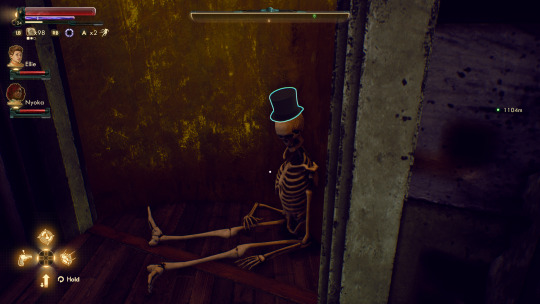
And in stark contrast to, say, Xenoblade Chronicles 2, all these improvements are very much not at the cost of what made the earlier game so engaging. Outer Worlds’, well, worlds are a blast to envelop myself in. The entire game is a shamelessly brutal satire of unregulated capitalism, with corporations acting as governments and demanding an almost religious reverence for labor and The Brand, even as the colony crumbles all around them. Each of the locations explores this in different ways, from the MSI’s flailing attempt to unionize to Edgewater’s blatant depiction of resource scarcity.
And the writing is phenomenal. I kept sending screenshots of dialogue to my sister, because there was so much that I thought was insightful or just plain hilarious. Despite how limited the character creator can be (why is long hair out of style?), every person feels distinct and every dialogue tree feels meaningful, reinforcing the game’s key themes while working excellently on their own merits.
The companions are a blast, too. There’s no romancing them in this one, so their quests are all about character growth without any uncomfortable expectations of a sultry reward—and they’re great. Tripping out with a vicar to have him confront the contradictory nature of his religion. Helping some idealistic kid come to terms with the unfortunate reality of his revolutionary ideals. Helping a mercenary lay her companions to rest. Cheating some scummy “parents” out of money they own illegitimately. That robot is cool too I guess.
But Pavarti. Pavarti! Her one dumb sidequest is so simple, but so shamelessly earnest and optimistic that I immediately fell in love with it. Just…how many games have you acting as a wingman for another character’s romantic exploits, helping a character achieve their best selves without immediately jumping into the protagonist’s pants—or for that matter, anyone’s pants? How many games have a romance subplot that checks off not just one but two letters in that LGBTQA+ acronym? How many games can even attempt half of these things without coming off as pandering or saccharine, especially in a world as snarky and cruel as Halcyon?
That’s enough coherent gushing. Here’s some extra bits I thought were neat:
No lockpicking or hacking minigames! As long as you have enough picks, and your hacking skill is high enough, you just hold down a button until the thing opens.
The game’s approach to stealth is…interesting.
On one hand, you have the whole thing where you crouch-walk around enemies until a meter over their head fills to indicate that they see you, and unlike, say, Deus Ex you can’t just stealthily pick off enemies one by one. You either sneak around or fight, and all the stealthy approach will do if you can’t or won’t completely avoid enemies is let you get the upper hand.
On the other, you have something particularly genius: if you find a particular organization’s keycard, you can disguise yourself as them when walking into restricted areas. This happens automatically, as soon as you walk past a “RESTRICTED AREA” hologram, and then a meter appears, showing how long until your disguise disappears. In a final twist of brilliance, the meter only goes down when you move, so moving around in these areas is about careful planning more than speedrunning.* The combat is fine. I was way overpowered well past the halfway point, to the point where this game’s equivalent of Deathclaws took me seconds to annihilate, often without a scratch, and my companions yelling about how my weapon was ineffective (due to its elemental affinities, but again, I was OP, so it didn’t matter). But I’ll take “dull” over “fucking cazdors” any day of the week. That, and the final area was oddly difficult considering how breezy the rest of the game was.
Look, man, I loved this game. It might even be one of my favorites ever. I truly do not care that the game as a whole feels a little cheap compared to, say the PS4 God of War, or that it lagged a little bit throughout my whole playthrough. When it came to the parts that mattered, it succeeded with aplomb.
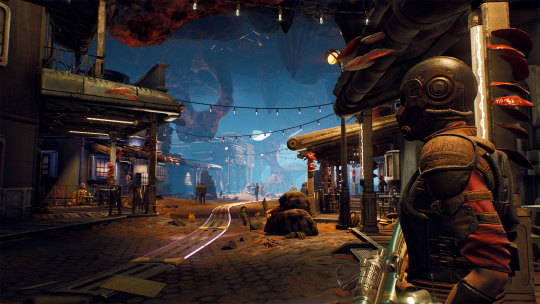
Playthrough notes:
Played on PC via Game Pass.
Playtime: about 30 hours
Completed the game and seemingly most sidequests, including all companion quests (but not that one modeling sidequest). Sided with Phineas but used a smaller portion of the MacGuffin.
Source for images is the game’s official website, except for the skeleton guy in the hat, that was my screenshot.
22 notes
·
View notes
Text
Big City Interview Part 2: Just a Little Bit of Patience
So after nearly 20 minutes of wandering around aimlessly, I finally found myself in the correct building. I walked into a shiny elevator, pressed the correct button, and walked out onto the fourth floor. To my left, a door was being held open by a woman who was clearly waiting for someone. I apologized for my confusion, and she said some variant of "no problem!" and I walked right into the office.
Now, this office...was something. It very professional, for one, with a receptionist's desk on the left and various seating arrangements on the right, and a glass conference room directly ahead. The only difference is that the floor was rock-hard concrete that was polished but uncarpeted. The woman who ever-so-patiently held the door open for me--hereafter referred to as A1--then led me into that conference room where I asked her a few questions about some forms that I was asked to bring in.
That situation was cleared up, and then she left to hunt down the other two people I would be interviewing with, after directing me to a water cooler. So I sat there alone in the conference room, and waited. And waited. and for good measure, waited some more.
Every now and then someone would walk by. If they were a guy, I'd barely register their existence, but if they were a woman, Id be subjected to the awful thok-thok-thok of their heels waddling along the concrete floor. I don't know how they can stand listening to that noise every time they take a step on top of how mercilessly uncomfortable they must be. I don't know why they do it. Masochism? Raw derangement? Systemic sexism run amok?

Someone looked at this and thought, "Hey, why not put my feet in there and walk around? Photo by lulek41 via Pixbay.
Eventually I stopped wondering about other people's feet and walked around the room, examining the tech there. There were webcams and phones randomly thrown on top of a cabinet on one end of the conference room, and multiple TVs on the other end. In my experience, this is where a conference room would normally have a whiteboard, but instead there were screens. Except the screens had clips on the bottom with whiteboard markers in them, just like whiteboards. Maybe these were Smart boards? but they were black, like TVs.
Still no one arrived.At one point I even just marveled at the floor-to-ceiling glass walls. What kind of a place bothers with those? Aren't they fragile?
(In case you couldn't tell, I was rather bored.)
After what seemed like forever, A1 finally returned, and told me to move over to the next room over, which was a smaller conference room. There were two other people in there--N2, an Asian woman, and T, a stoic-faced white man. Then, probably a full hour after I had left my car, the interview finally began.
The first one, at least.
All three people had their own copy of my resume, and they asked me about a few things on it. Then they asked me to "tell me about yourself", and then they asked me about my jobs. I was kind of nervous and overwhelmed by this point, so I answered as best as I could but wound up stammering and repeating myself a fair bit.
Rather frustratingly, one of the questions they asked me was about gaps in my resume, as if it was somehow my fault that I didn't have job right out of college. I could understand if this question was being asked by some geriatric Boomer who genuinely thinks that people put avocado on toast, but I was being asked by a woman who couldn't have been in her 30s. It took me a decent amount of willpower to keep the frustration from appearing in my voice as I patiently explained that I was facing more than a little bit of competition caused by drastic changes in hiring practices over the last 20 years.

Photo by TeroVesalainen via PixaBay
But then the real meat of the interview started. See, you know how one of my favorite questions to ask an interviewer is, "Can you tell me about the company? I want to hear it in your words."? Well, they spent the nest 20 minutes or so asking me that question. I had to tell them about the company. They'd explain one general detail about how it works, and then they'd ask, "so how do you think that works specifically?" And I'd stammer out something vague and questionable, and then they'd explain their side of things without telling me if I was right or wrong.
Now, I know what they were trying to do. They were trying to keep me attentive and an active participant in the conversation, while also ensuring that I knew what the company did and how it did it. But this was a stupid-ass way to handle things, and it's all down to a little thing called subtext.
See, I'm on the autism spectrum. Subtext is usually invisible for me. But even I could understand that everyone in that conference room was being resolutely polite and deliberately ambivalent toward my behavior. I couldn't afford to get angry or frustrated at the questions I was being asked, because people don't hire angry or frustrated people. Similarly, they could not afford to bluntly tell me that I was wrong about anything, because that disappointment would stick with me every time I saw their faces, and if I was hired that would be a frequent occurrence. This of course goes without mentioning that showing the slightest bit of favoritism or disdain towards a potential new hire opens them up to lawsuits, if what I've heard about those sorts of things is true.
But they were essentially asking me to make up the entire nature of the company out of whole cloth, and if they couldn't tell me when I was completely off-base, I would walk out of that interview with no understanding of the job at all.
I think that the company works with suppliers to find out how much it would cost to get rid of all sorts of inventory. Like, you know how Toys R Us had a going-out-of-business sale? That's apparently called a liquidation sale among professionals, and this company's job would be to say, "Hey, you know that one dumb toy line from 5 years ago that we haven't managed to sell? We should sell that for dirt cheap. But LEGO sets are literally a better investment than gold so mark those for maybe 5% off if you're feeling generous."
Except that they usually don't work at the time of liquidation, but when companies are doing well, and telling them, "You know, if your company happened to go all Titanic on us, this is what you should sell your stock for"? Except the company doesn't do business with manufactures, but banks, and this whole process only starts when a manufacturer takes out a loan against its stock? Or something? If you think this is hard to follow, imagine how hard it was when I felt I was pulling all this out of my ass based on vague hints that the interviewers offered.
Eventually we got to the point where I asked questions about the job. My specific duty would be to help other writers, well, write. The interviewers' favorite part of the company was the people and the wide variety of industries they work with, from electronics to furniture to specific components of larger devices. I asked them about the TVs in the other room--were they actually whiteboards? The laughed at this, and told me no, that the markers were use for large pieces of paper nearby.
Then they got up, shook my hands, and walked out the room--but before I could follow, they told me that the interview had only just started.
And this post is over 1000 words so I guess it's time for a part 3.
#blog#confusion#employment#heels#humor#interview#Irregular Interviews#part 2#big city interview#sexism
3 notes
·
View notes
Text
Big City Interview Part 1: Lost in the Concrete Jungle
This day was about time for a good old-fashioned Proper Interview. Not an interview over the phone, or with a staffing agency, or through one of those garbage questionnaires, but one where I had to physically haul my ass to some office building to speak directly with the people who might eventually be my supervisors. More than that, actually--it was a Big City Interview. In contrast to the small-scale franchises or local businesses I usually applied to, this job was in a building tall enough for Spider-Man to swing off of, and to say I was intimidated would be an understatement. But I'm getting ahead of myself.
The first thing to note about this journey is that I got dressed in a minor rush; part of that process involved unbuttoning the the top two buttons of my dress shirt to put it on easily, and loosening my tie slightly to ensure I wasn't choking. Now, I want to point out that I was being strategic here, not lazy. After all, I don't need to look completely sharp while I'm driving. You might think I would have the intelligence to correct those shortcuts before the interview started. You would be wrong.
Now, despite my being in a rush, I decided to leave early just in case I wound up running into any problems, and this turned out to be correct enough assumption. See, the job I was applying to was located in a skeevy part of town. Not scummy--I don't think there was gang violence or anything--but most of the buildings and roads were cheap-looking and poorly maintained, with the notable exception of the massive billboards every few blocks. But the company I was applying to was anything but "skeevy"; on the contrary, it was shiny and green, a distinction sharp enough to fuel a dozen generic YA novels about class warfare.
As such, the campus of the offices where I would find myself that day were locked behind those kind of gates that make you validate parking with cards that they print out before they a metal arm swings up to let you drive in. I was not familiar with these sorts of machines, so naturally when I pulled up next to the parking pass dispenser machine, I was too far away to reach. I tried to stick my arm out, but no dice. I eventually had to kill the engine to my car, open the door, unbuckle my seatbelt, hit the button through the open car window, watch the paper come out and the arm swing up, close the car door, put my seatbelt back on, start my car up again, and move on my way.

The buildings were only a fraction of this size, but this is how they felt. Source: Free_photos via Pixbay
Now, this campus was a big place, with at least 5 different buildings for who knows how many organizations, few of which were labeled. All I had to go by was an address and suite number, but before I could even manage that, I had to find a place to park. I absolutely hate being stuck in my car, driving around without knowing where to park, so my policy when entering a new place is to find the first available spot I can see and wander around on foot. Right after I pulled in past the initial gate, I was directly facing a parking structure, so I pulled right on in there. There was another gate with an arm, so I was not--and still am not--sure that I was meant to park there, but when I pressed a button on an intercom the gate swung open so I moseyed on in and parked next to a black Honda Odyssey.
(Well, yes, the parking structure did have the word "visitor" on it, but other areas of the campus had the word "guest" used to refer to different parking spots, and will go to my grave without knowing the difference between the two.)
At this point, I got out of the car and examined myself. This time, I dressed myself properly. I had showered and my nice shoes were tied tightly on my feet. I had even thought to bring masking tape to help pick away at the cat hair that was all over my clothes. Now properly prepared for a legitimate interview, I set off to find the right building.
I immediately failed. All of the buildings on the corporate campus looked identical--massive, generic blocks of concrete and glass, with unit numbers hidden on one seemingly random face of the building. So I walked around, here and there, left and right. There were other people walking around, too. Some wore badges, but I couldn't check to see if they were from the company I was applying to without being creepy about it. Others wore headphones. The people seemed to come from all races, ages, and creeds.
Eventually I found one shorter guy with pathetic facial hair and asked him where I should be headed, which was right in the general direction of the parking structure, and specifically at a building I had walked past before after being unable to find the unit number on its side.
In order to properly explain what happened here, let me whip out MS Paint.
This is the path I had taken after leaving the parking structure (the N is me, with "N" standing for "Noodlehead"):

That big rectangular building in the center would eventually prove to be my destination, but since I couldn't see the unit number on it I walked right past it. All I saw was two small doors specifically labeled for electricians. Now, after talking with the guy, I found myself traveling back, looking at the building again:
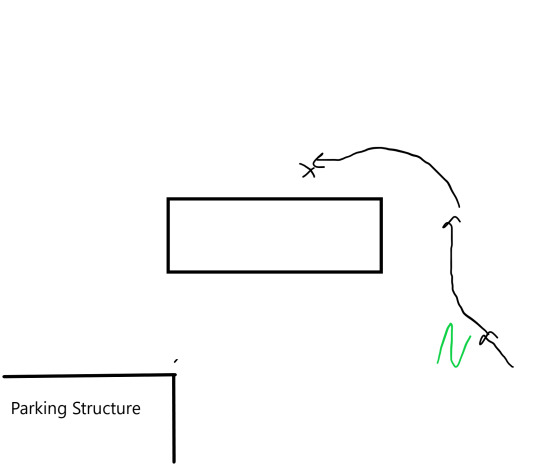
After looking at what seemed to be the fourth and final side, I finally saw the unit number I was looking for. This side had a door, but it was completely unlabeled, which was the best option I had at the moment. At this point, I had maybe 10 minutes until my interview, so I wasn't running short on time, but I still needed to get into the building. I knew beforehand that I needed to call someone from the company to unlock the door for me, so I figured that this was the time to take out my phone.
It is around this time that I finally realized that my fly had been completely open all this time, revealing my blue boxer briefs for everyone to peruse. This, at least, I fixed.
I called the number I was given, hoping that I would see someone walk through the door, thus confirming that I wasn't completely lost. The person on the phone told me that she would open the door for me, so I waited a few minutes for someone to appear behind the door. They never did. I called again and asked if she was waiting for me, and she said she was--and she mentioned something about an elevator. There was no elevator outside, so I apologized, explained I was a little lost and would try to fix my situation shortly. So I wandered around a little more and was struck with A Revelation.
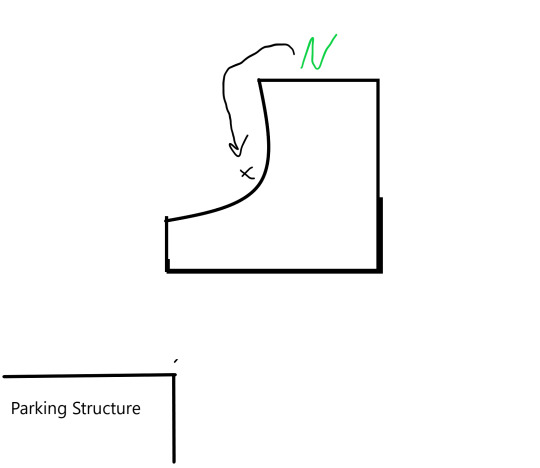
Apparently, my sense of direction was so monumentally shitty that I completely misunderstood the size and shape of the building I was walking around. Had I just kept going straight after leaving the parking structure, instead of turning right, I would have realized that the building was concave, and not a rectangle, and the entrance was very prominent and obvious. But instead I took the longest way around possible, confusing both myself and my potential employer.
So, in summary:

This is the true path I took. The interview hadn't even started, and I already felt like a dumbass.
4 notes
·
View notes
Text
Temp Agencies Are Lame
In an endless fog of unemployment, temp agencies attempt to be a shining beacon, lighting the way to a bright future of gainful employment. But in reality, they are anything but. My local area was swimming in temp agencies, and every time I entered one, I would dress up in a spiffy suit and tie, prepare a resume, get an interview with someone from the agency, and leave with the promise that the company would work hard to find me a great company to work for.
This would never actually happen.
It didn't matter if I called the agency every week, if I filled out all the paperwork on time, or if I just ignored them like they told me to do--the agency would always ghost me with such regularity that I wondered if I was haunted.
This process went on for years and years, across at least a good half-dozen different agencies, until one day I got a call from one asking me to come in for an interview. I said yes, of course, and then tried to get myself ready.
I failed in no less than four ways.
Firstly: I had planned to take a shower right before I left, to ensure I was fresh and clean and didn't offend my interviewer's nostrils. Well, I tried to do that...only to be met by a shower that was so pathetically lukewarm that I didn't have a choice but to leave after only washing my pits. After all, it was cold out, and I didn't want to risk being any more cold and wet more than I needed to be.
Secondly: cats. I have them. three, in fact. And this means cat hair, everywhere, all the time, with more strands appearing the more you try to brush them away. Cat hair, of course, is particularly notable on dark-colored suit jackets and slacks, and of course those are the only appropriate colors for a man who wants to get a job without bewildering an employer.
Thirdly: shoes. I have a very shiny pair of dress shoes that I have borrowed from my dad without any real intention of returning. I have heard that they were very expensive, and they look it, giving my every step a debonair flair without being tremendously uncomfortable. So naturally I didn't realize that I was wearing my daily New Balance sneakers until I was over halfway to the interview.
Fourthly: The interview was very close to the library, and I forgot to get the books that I wanted to turn in that day.
All these left me standing outside my car after parking it at my destination, vainly attempting to pick cat hairs from my suit jacket, and hoping I didn't smell that bad. I remembered I had a pair of black Vans sneakers in my trunk, which weren't exactly fancy but were definitely better than my usual sneakers which had a big white N on each side. I eventually realized that I had done all I could to save me from my fate, and moved toward the office.
The office building had one of those touchscreen directories, which was tremendously unhelpful as it just let me know what number was associated with each business without letting me know where I could actually find the place I was looking for. Luckily, I didn't have to wander around that much to find it.
So I did the usual bit of ringing a bell to summon a receptionist, then waited for her to appear. Because we are in The Future, the "bell" was actually a bell-shaped button on a plastic remote. The receptionist appeared, carrying a clipboard with a blank form on it, and she directed me to a side room after telling me that the guy I was going to speak with was running late. I was not given the clipboard.
So I sat there. And waited. and waited. Probably a good 20 minutes of just me sitting in this small room, at a round desk, staring through the clear door I walked through and waiting for someone to appear.
Slowly, I began to realize that this wait would actually work in my favor. If I was sitting opposite the room's only entrance, the employer would have no choice but to sit down without walking around me--and with me sitting down, he would never be able to see my shitty sneakers and fur-covered pants!
So down I sat, waiting for someone to walk through the door. I eventually considered looking at the news on my phone, hyper-aware of my surroundings to put it away at the first sign of someone through the door.
Eventually, after what seemed like forever, a guy who looked like Eddie Murphy cosplaying as Michael B. Jordan appeared. He was carrying the clipboard from earlier, which now had a copy of my resume added to it. He sat down and complemented me on my attire, and if there was any irony in his statement I'm going to willfully ignore it.
We then spent the interview going down my resume. He felt that my work history should be up top, rather than my skills, and he had me go through each of my jobs in detail, and some of my skills like Excel.
Random trivia: If you have even the vaguest conceptual knowledge of what programming might be like, and you want to know how to be more marketable, google "Vlookup", a particularly useful Excel formula. Mentioning that is like the #1 way to seduce an employer.
Anyway, the employer was friendly if a bit hurried, and after he finished doodling all over my resume he gave me his card, and the cards of some of his coworkers, shook my hand, and left. He never saw my shoes. Nor did he give me the critiqued resume, making me wonder exactly what the point of writing over it was.
He told me that he would email me some forms to fill out--something that he said he would do before the interview, and which never occurred--and booked it out of there to do something more important.
So I left, went home, and wrote this blog.
#cat#cat hair#cats#employment#interview#Irregular Interviews#Jobs#office#temp#temp agency#temp agencies#blog#humor
3 notes
·
View notes
Text
An Infinity Problem
Some days I just wish I could get things right for once.
After being assaulted with vague spoilers over a weekend, I finally caved and saw Avengers: Infinity War last week. The movie was great! The last five minutes will haunt my dreams forever! But I’m not here to talk about that—I’m here to talk about the hour or so before the first “THE FOLLOWING PREVIEW HAS BEEN APPROVED FOR GENERAL AUDIENCES” card played.
So, after my part-time job ended for the day, I decided to go to the mall to see the movie. It started about an hour after I arrived, but I figured I would buy a reserved seat and wait out the intervening time in the mall. You never know, maybe GameStop wouldn’t be completely worthless today. Thus, I stepped outside into the cold—only to feel a light drizzle of rain on my face. Well, no matter; I had brought my handy-dandy all-purpose rain jacket with me for just an eventuality.
But a few steps toward the indoor part of the mall revealed that the rain had not always been this light. The ground, which was comprised almost entirely of slick tiles, seemed to actively repel the rain rather than absorb it. The end result was that the entire path from the theater to GameStop was covered in the world’s thinnest lake, and basically guaranteed that I was going to fall directly on my derriere at some point.
The wise thing to do would be to wait out on the tables in the theater’s always-vacant restaurant, but I am not a wise man. With my hood over my head, I sloshed through the murk, every step threatening to send me careening into a brutally moist embrace. Somehow, I made it to GameStop, and naturally they had nothing that I wanted.
But then I felt a rumblin’ in my tumblin’, and I found myself marching towards the nearest bathroom. I had a quality time in there trying to avoid spoilers on Reddit, and when it came time for me to leave, I discovered that it was time for me to get to the theater. As I carefully made my way through the rain once more, I did what I call the Standard Inventory Check:
- Keys: Yes
- Wallet: You betcha
- Phone: Phone? PHONE!
I tapped my pocket—then again, and again. It was no use; the little black rectangle to which I had given my soul had gone. My mind raced, and I realized there was only one place it could be: in the bathroom, the second stall from the left.
I turned around and began to ran, before immediately thinking better of it—if I faceplanted out here among these remorseless, wet tiles, I would likely be out a phone and the chance to see a big purple guy punch all of my favorite characters repeatedly in the face on the silver screen. But at the same time, that phone contained all of my deepest, darkest secrets (which admittedly wasn’t much worse than how broke I was). I needed to get in there, and fast. I made a snap judgment, and committed to it.
If anyone happened to see a weird guy in a black hooded jacket frantically goose-stepping his way to a pair of automatic doors…well, I can at least assure you that he wasn’t high on anything except raw desperation.
By the time I reached the stall, all of five minutes had passed…but the door would not open. A voice echoed from within, informing me that the stall was occupied.
“Hello there,” I responded.
“I’m a little busy,” the voice said.
I was unmoved. I was on a mission, and I needed to complete it. “Please look to your left,” I said.
“Oh, is this your phone?” the voice asked. “Yeah, it’s still here.”
Thank our lord and savoir Mata Nui, I thought. “Great! Can you throw it under the door or something?”
“Don’t worry, I’ll be out of here soon.”
I didn’t have much of a choice but to say, “Fine,” and wait out the inevitable. I wanted to check the time, so I reached in my pocket only to be met with a wave of disappointment. I wanted to wait out these minutes by browsing the internet, but again I found myself at a loss.
After what coincidentally felt like infinity, the voice finally extricated itself from the stall to reveal that it belonged to a tall bearded man, with a familiar-looking black rectangle dangling daintily between his thumb and forefinger. I reached toward his outstretched hand and then realized exactly what he was offering. See, the way most bathrooms work, you get to the sink to wash your hands after you finish, er, using up toilet paper. My phone had just been handed to me by someone who was currently between those two steps.
I looked down in horror at my phone. It looked clean, but one can be too careful with these things. I did the only thing I could with the time given to me and quickly splashed the potentially offending area of my phone with as much water I dared apply given the lack of rice in the vicinity.
I wound up making it to the theater just in time, which was good because the film started 20 minutes late and glitched directly ino the middle of a trailer for Jurassic World. But from then on it was fine. At least, for the people on this side of the screen.
But hey, at least Thor doesn’t have to worry about getting poo on his phone.
25 notes
·
View notes
Text
Minimum Wage, Maximum Effort
You know, I prepared for this interview. I went to a proper mock interview, got a fancy new folder, triple-checked that my resume was printed out and inside that folder, and made sure my tie was uncomfortably tight as God intended.
But I seriously don't think that people even know how to give proper interviews anymore.
Let me back up a bit. Under the advice of those who I trusted to know better than me, I decided to stop applying for jobs that would use my Bachelor's degree, and instead decided to supplement my apocalyptic wasteland of a resume with something a little more boring--in this case, a minimum-wage stocking position at a major retailer on its last legs. I somehow managed to go through enough loops to be asked to come in for an interview, and, well, there I was, walking into a store while dressed up in a suit that I hoped didn't look too shabby.
Before the interview, I was told to find the HR department next to optical and ask for a particular manager. The signs pointed to Optical, but not to the HR department, so I walked into the first open door I saw and wound up annoying some guy hiding in the corner, clearly on his lunch break. He informed me that I was in the break room and that I should bother, well, literally anyone else--or to use his exact words, "a floor person".
I apologized and walked out of the break room, then made awkward eye contact with one of the optometrist-ish people. She happily said "Hi!", which naturally forced me to talk to her; after I explained my situation, she directed me to the exact same hallway I had left.
I felt a mite frustrated, but I decided to walk into another, less promising-looking open doorway, which led me to another hall. At the end of the hall was a door promisingly labeled "Human Resources". It, of course, was locked. I knocked and a hunched-over, white-haired man appeared out of the shadows, and he offered to find the relevant manager.
So I waited. Eventually, I woman came in, and I shook her hand. She was not the manager. The manager was behind her. I shook his hand and introduced myself, and followed him into a ratty-looking office. I sat in front of a computer whose screen was annoyingly only displaying a blank blue light. I spent the entire interview wishing I could turn it off.
What followed was a rather direct interview. There was no, "Tell me about yourself," or, "What is your biggest weakness" or anything like that. He just had me wait while he looked over my resume, then asked me questions about that.
- "Why did you leave this job?"
- "I noticed that you haven't worked in 2017..."
...aaand that was it.
He then moved on to the "Actual Questions" part of the interview. I put that in quotes because they were not traditional interview questions:
- What was your favorite safety rule in your last job?
- Describe a situation that required you to keep your workplace clean.
- Describe a situation where you had to pay attention to details.
I mean, these feel like standard-ish interview questions at first, but if you think about it...who actually asks these? No one, that's who. Why am I supposed to have a "favorite" safety rule? Does he expect me to say, "Gee, mister manager sir, I can't choose between wearing a seatbelt in a car and having to pick up my Snickers wrappers." I highly doubt I will ever get these specific questions again.
After the interview, I asked for a business card, at which point I was informed that I was actually in the manager's boss's office. Thus, I wound up following him across the whole store to his actual office, where he spent a good minute digging through his poorly-organized desk for a business card. He handed it to me, and I happily called it a week later to learn that I had been passed over for someone else.
So that's nice, I guess.
3 notes
·
View notes
Text
Bigfoot And Data Entry
This day's interview was for a simple Data Entry position--you know, staring at a computer and typing in information. Boring, but purposeful; just the way I like my work. The person who gave this interview--let's call her Sam--might be one of the nicest people I have ever met. And I don't mean "fake nice"--she seemed genuinely understanding of her worker's concerns and all that.
I hate her so much.
Let me start from the beginning. The office was right where I thought it would be, maybe 5 minutes from my house in a building that was completely unlabeled other than an erroneous sign on the main entrance. Every window was blocked by curtains.
When I entered the office, I was immediately greeted by a bunch of casually-dressed millennials typing away at desks while two older women ran around looking busy. I introduced myself, and was told to wait at a desk while someone else came. Eventually, I was directed into a small room to talk with the aforementioned Sam, who explained what the company was and how that works.
It seemed like a nice place to work. Sam understood if not encouraged people to look for work while working there, even allowing for people to cut time out of their work day to attend job interviews. She lets people listen to music while they work. Assumedly, this is with headphones, as I did not hear anything while I was there.
Notably, she did not ask me any questions about myself, beyond asking what about one of my previous employers while looking through my resume. I should have interpreted this as a red flag, but I let it slide.
Then came time for me to fill out a job application. Looking at the paper in front of me, I assumed that it would be a simple matter of writing a handful of proper nouns and other such information that even I can write, and to a large degree this was true.
...but then I saw the _other _packet, and I gave into despair.
It turns out that I _also _had to fill out a test, and it might have been the stupidest, most garbage test I have ever seen in my life.
Here are some sample questions. I am not making a single one of these up.
How many words can you find in the following jumble: URDERM.
(Yes, that's "MURDER" unscrambled. What the hell.)
If you were a brand, what would your slogan be?
Do you believe in Bigfoot?
Name two people you have met recently.
Do you consider yourself lucky?
Describe how to make a scrambled egg.
Describe in detail something great that happened to you recently.
How would you sell hot cocoa to someone living in Florida.
After reading these questions, I immediately felt like someone had shot me with bullet laced with raw depression. How am I supposed to answer a single one of these, especially under the high-stress environment of a job interview?
After looking through the test and reluctantly answering the Rancid Garbage Questionnaire portion (because _of course _that was a thing), I walked up to Sam and explained that I had dysgraphia--in other words, handwriting so bad that it qualifies as a proper disability. After a little bit of work, we managed to have me type up my answers on a Google Doc...or at least some of them.
Of the ridiculous questions I listed--which are only the ones I can remember--I was only able to answer the MURDER and hot cocoa ones. I had to leave the rest completely blank. Yes, even the "Something great" one, which had a whole page dedicated to it. When Sophie saw this, I explained that I'm not good at being taken by surprise like that--something that felt like the wrong answer, but was nonetheless true.
I thus spent the remainder of the interview incredibly morose, because she was only asking for a little bit of ingenuity and I failed because I lacked a crucial skill--improvisation--that nearly every job asks for. This was only compounded when she pointed out that a lot of big companies like Google also ask similar questions.
The rest of the interview was a blur. She told me to call her back if I'm not contacted by next Friday, and gave me a sticky note in lieu of a business card.
Driving home, I got angry. Asking me this crappy, disarming questions wasn't being a clever employer or some nonsense like that. It was a gross misuse of her power as an interviewer, showing a fundamental misunderstanding of the political climate of a job interview.
This Sam woman was not my friend. She was not my buddy, or my teacher. She was my judge. Every single word I said to her was said with the assumption that it would be dissected under a microscope for intimate details about my past and personality.
So when I am asked a question, I absolutely _cannot _afford to answer it with complete honesty; I need to take that honest answer and find a way to rephrase it in a way that makes me look good and is relevant to this job.
So when you ask me if I believe in freaking Bigfoot, I can't just say, "I guess not" or, "I've never really thought about it," because the _actual _question lies hidden between the lines...and I was not able to do that for her stupid questions. Heck, I wasn't even able to answer the questions honestly, because 16 years of tests have taught me that "I don't know" is never an acceptable answer.
So when she was asking me these inane questions, she wasn't cleverly trying to pin down my personality, she was asking me to put on a magic show with no tools.
I felt intimidated and confused, and eventually angry. I don't care what Google does, interviewers have no right to ask these questions because they don't have the right to judge me for my answers to topics that have no relevance to the job I'm applying to.
2 notes
·
View notes
Text
Let me tell you about these things I like to call “Rancid Garbage Questionnaires”.
Let’s say that you’re a bright, young high school student looking to enter the workforce and Do Things to get some delicious moolah. You go through the usual troubles, entering your name, address, phone number, and other potentially relevant information into various text boxes. You painstakingly recount every detail of what little previous employment you have, and you stretch your brain thinking of potential references you can list that aren’t just your mom’s friends. But finally, after what feels like hours of typing, reviewing, and uploading, it is time.
You take a deep breath, pray to whatever god or gods are feeling particularly friendly that day, and click “submit”. Whew, you tell yourself, at least that’s over. You get up to stretch your aching fingers, your mind already thinking about the Mario game you’re about to play downstairs when...
The Rancid Garbage Questionnaire rears its ugly head.
The Rancid Garbage Questionnaire is an employment toll designed by grouchy old geezers as a panicked response to the Internet Age. The basic idea is that, since applicants no longer have to physically hoof it to a physical store using their squishy, physical bodies, there will be a tremendous deluge of qualified applicants. Now, a responsible employer would take the time to interview every one of those applicants, but no one has time for that in today’s dystopian cyberpunk society, so now we have to get the robots involved.
Oh, no, not a real robot, that you can punch in the face when they get on your nerves; that would cost money, and no employer wants to do that. No, the only way that the interview process can be automated is with tests. Multiple-choice tests about subjects that have no real answer.
The first part is simple in appearance but absurd in its execution: you’re given a list of opinionated statements, and you’re told to describe how much you agree or disagree with them by filling in the relevant bubble—“strongly agree”, “strongly disagree”, etc.
These statements initially seem like they’re easy to agree to; why yes, I would agree that “My friends think I am a valuable team player”! But then you come across statements that are seemingly designed to incriminate you: “I am known to anger easily”, “I consider myself to be a quiet and shy person”, “I often get frustrated”, etc.
On one hand, it should be my duty to answer these questions honestly and accurately, so as to give the creepy A.I. that will transmit my responses to my employer a good understanding of just what kind of schmuck they’re hiring. On the other, it is also my job to make myself look better than every other applicant.
So with that in mind…who in their right mind would say that they “strongly agree” to saying that they “often get frustrated”? I mean, a reasonable employer might realize that everyone with a pulse gets frustrated frequently, but I doubt whatever algorithm that this test is using will be so understanding. Same with being shy; I’m one of those guys who is about as charismatic as a brick wall when I’m in a new social environment, but give me a week and I’ll be cracking jokes and referencing outdated memes with the best of ‘em. But God forbid that I have a chance to explain it before the test judges me into oblivion for not being a social butterfly.
Eventually, this madness stops, only to be replaced by an even worse variant: The Hypothetical Scenario. In this portion of the Rancid Garbage Questionnaire, the test describes some situation that needs to be resolved, and you’re supposed to choose which of four or five options you would choose. Typically these involve a belligerent customer or conflicting orders from multiple supervisors.
What really grinds my grits about this section is the little message at the start of it, where the test somehow insists that there is no “right” answer to these questions. That changes this from a test like the kind that 16 years of public education has granted me mastery over into some sort of completely unfamiliar nonsense. All my life, I have been trained to look at these types of questions and systematically eliminate the incorrect ones; now I’m supposed to pick the one that, uh, feels better than the rest?
But that’s not the worst of it. Oh no. See, the long and short of the matter is that I should be asking my employer these questions. How can I, a dumb kid who never worked a quote-unquote “real” job in my life, be expected to know how to handle unusual customer requests or thieving co-workers? I am absolutely willing to be taught this information, but it’s being held like some kind of trade secret! Surely employers would benefit by teaching their employees about company policy on the job itself, so why am I being quizzed on information I cannot be expected to know until then?
After what at least felt like a full hour longer than you intended to spend on one simple, stupid, minimum-wage-paying job application, you finally reach the end of the Rancid Garbage Questionnaire, and with it you finally, finally have applied to a grand total of one job. You look back on the experience with confusion and regret. You think to yourself, Should I have really chosen “contact my supervisor” for that one? Or, on second thought, I don’t think I do work well under pressure, but it is too late.
No one will ever mention this application again, even if you get an interview. Somewhere, an incomprehensible algorithm has already sorted through its findings and assigned your personality to some specific, quantifiable value, and has lined up your results against other applicants’ who answered the questionnaire more favorably than you.
But you don’t know that. You’re too busy looking up another store to apply to. You tell yourself, hey, at least I know how to answer these types of questions now.
You are wrong. And you will never know why.
6 notes
·
View notes
Text
Irregular Interviews: Pathway Translations
Finally, a normal interview for once.
The first thing I noticed was that parking was a pain. Every spot seemed to have a sign threatening a tow if you didn't know exactly what you were doing, which felt almost like a personal insult to someone as endlessly clueless as myself. Eventually I just parked next to one of the least scary signs near the main building, and nervously shuffled inside. Thankfully a receptionist inside confirmed that my car wasn’t going to get kidnapped by a random tow truck while I was trying to make myself look like a potential employee.
I took the elevator to the second level and noticed that the whole building felt...dingy. The carpet was an old, ugly gray color and was torn up in places. It wasn't, like, Hell's Kitchen bad, but it was a notable step down from most potential employers that I've visited.
“Pathway”'s main office was better--but not great. The biggest piece of furniture I saw was a series of shelves with anime-ish figurines inside them, which was right to the left of me as I entered. Now I’m not the biggest weeb in the universe, but I still felt surprised that I did not recognize a single character. The office itself had no carpet. The whole place felt rather empty, which made sense as I later learned that they had recently moved. As for actual humans who breathe and stuff, the place was populated with less than a dozen young adults who, in my brief survey of the office, appeared to largely be Asian.
After finding the person I was supposed to talk to, I was led into a side room that appeared to be a sort of break room with a water cooler, fridge, and a hybrid Foosball/pool table. You know, every employee’s biggest dream There was also a shelf completely filled with enough junk food to make the average soccer mom demand an exorcism. In there, I was told to fill out an application, which asked for all sorts of information. I very slowly and carefully filled out the stuff that was already on my resume, and omitted information that I didn't feel comfortable providing at that time (namely, my SSN).
Then, I was directed into an adjacent room that was sparsely furnished with a couch, class table, and a TV with a PS4. I could not see any games, but then again, it’s not like I was going to rifle inside their cabinets—I don’t think “snooping” is a marketable job skill. At least, not for this line of work.
When I had applied for this job, I did so with the knowledge that the company localized games that were initially published in some foreign language, so the game console was hardly a big surprise, but a part of me hoped that there would be copies of games that the company had worked on strewn about, players vigorously looking for errors that would need to be patched out later. Instead, there was only this one black box, next to this one black TV.
Eventually someone walked in, and that was where the real interview began. He refreshingly asked me all the typical questions: "tell me about yourself", etc. The only unusual stuff was asking about my gaming habits--I mentioned Mario Odyssey and Fallout: New Vegas. I kinda feel like he was hoping that I would mention some of the games that his company had worked on, but that didn't happen.
I was then informed that my job would be to help translate text for Korean games--that is, someone would give me a vaguely-comprehensible literal translation of some Korean text, and I would be told to rewrite it so it flowed naturally in English. They were specifically looking for someone who didn't know Korean. The problem, then, was that in this particular medium, the context for the text I would be translating would not always be available, and often I would have to guess at certain details.
After that interview, I was directed to a keyboard in front of a tablet, and told to complete a test. It involved, well, doing exactly what I described in the previous paragraph. I had a spreadsheet and was told to look at one cell of garbled nonsense and write what I thought it was trying to say in an adjacent cell, without any information about what the game was about or how its magic system worked or any other seemingly relevant details.
Naturally, I ran into a technical error partway through. I was able to restart the program to solve the issue, but I would up losing all of my progress in the effort. I started my guesswork from scratch and hoped that it wouldn’t be counted against me. After all, the proctor gave no indication that the test was timed.
After the test, the interviewer led back into the room with the PS4, and I asked him questions to show that I was actually interested in this. He said that he couldn't say every game that the company had worked on due to NDAs, but he then claimed that he had worked on MapleStory and a handful of other games that I only vaguely recognized.
This confused me a bit. I don't know anything about the way this practice is completed, but why would a company not be able to name previous projects? And why can I not find any mention of Bridgeway on MapleStory's website or Wikipedia page?
However, I did not voice those concerns. Instead, the interview essentially wrapped up then and there. As I left the office, I looked back and the cabinet with the anime-ish figurines and deduced that they were all tied to previous projects that the company had worked on, which were all games that I was too snobbish to bother with.
When I walked back outside, my car was still there and had not been abducted by rogue tow trucks.
At least, not as far as I knew.
2 notes
·
View notes